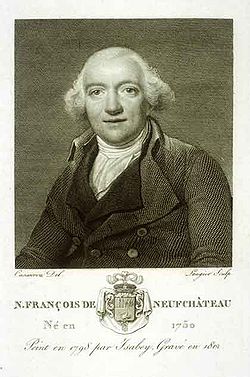- François de Neufchâteau
-
 Nicolas-Louis François de Neufchâteau (1798 engraving after a portrait by Jean-Baptiste Isabey.
Nicolas-Louis François de Neufchâteau (1798 engraving after a portrait by Jean-Baptiste Isabey.
Nicolas-Louis François de Neufchâteau (French pronunciation: [fʁɑ̃swa də nœfʃato]; 17 April 1750 – 10 January 1828) was a French statesman, poet, and scientist.
Contents
Biography
Early years
Born at Saffais, in Meurthe-et-Moselle, the son of a schoolteacher, he studied at the Jesuit college of Neufchâteau in the Vosges, and at the age of fourteen published a volume of poetry which obtained the interest of Jean-Jacques Rousseau and of Voltaire. Neufchâteau conferred on him its name, and he was elected member of some of the main academies of France. In 1783 he was named procureur-général to the council of Saint Domingue.
He had previously been engaged on a translation of Ariosto, which he finished before his return to France five years afterwards, but it was destroyed during the shipwreck which occurred during his voyage home.
Revolution
After the French Revolution, Neufchâteau was elected deputy supplant to the National Assembly, charged with the organization of the département of the Vosges, and elected later to the Legislative Assembly, of which he first became secretary and then president.
In 1793 he was imprisoned on account of his supposed political sentiments - as they were deduced from his drama Paméla ou la vertu récompensée (Théâtre de la Nation, 1 August 1793), but was set free a few days afterwards with the start of the Thermidorian Reaction.
Directory and Napoleon
In 1797, he became Minister of the Interior, distinguishing himself by his thorough administration. It is Neufchâteau who initiated the French system of inland navigation. He inaugurated the museum of the Louvre and was one of the promoters of the first universal exhibition of industrial products. He replaced Lazare Carnot as a member of the French Directory, a position he held between 8 September 1797, and 20 May 1798.
From 1804 to 1806 he was president of the Sénat conservateur, coinciding with the establishment of the First Empire - his office implied that he was the one to solicit Napoleon Bonaparte to assume the title of Emperor. In 1803, he was admitted to the Académie française, and in 1808 he received the dignity of count. Retiring from public life in 1814, after the Bourbon Restoration, he occupied himself chiefly with the study of agriculture until his death.
Works
Neufchâteau had multiple accomplishments, and interested himself in a great variety of subjects, but his fame rests mostly on what he did as a statesman for the encouragement and development of the industries of France. His late poetical productions are not judged to be as original as his youth oevre.
He was a noted grammarian and literary critic, as is witnessed by his editions of the Lettres provinciales and Pensées of Blaise Pascal (Paris, 1822 and 1826) and Alain-René Lesage's Gil Blas (Paris, 1820). He was also the author of a large number of works on agriculture.
Bibliography
- Poésies diverses (1765)
- Ode sur les parlements (1771)
- Nouveaux Contes moraux (1781)
- Les Vosges (1796)
- Fables et contes (1814)
- Les Tropes, ou les figures de mots (1817)
See also
References
 This article incorporates text from a publication now in the public domain: Chisholm, Hugh, ed (1911). "Nicolas Louis, count Francois de Neufchateau". Encyclopædia Britannica (11th ed.). Cambridge University Press. http://www.1911encyclopedia.org/Nicolas_Louis,_count_Francois_de_Neufchateau. In turn, it cites as references:
This article incorporates text from a publication now in the public domain: Chisholm, Hugh, ed (1911). "Nicolas Louis, count Francois de Neufchateau". Encyclopædia Britannica (11th ed.). Cambridge University Press. http://www.1911encyclopedia.org/Nicolas_Louis,_count_Francois_de_Neufchateau. In turn, it cites as references:- Recueil des lettres, circulaires, discours et autres actes publics émanés du duc François pendant ses deux exercices du ministère de l'Intérieur (Paris, An. vii.-viii., 2 vols)
- H. Bonnelier, Mémoires sur François de Neufchâteau (Paris, 1829)
- J. Lamoureux, Notice historique et littéraire sur la vie et les écrits de François de Neufchâteau (Paris, 1843)
- E. Meaume, Étude historique et biographique sur les Lorrains révolutionnaires: Palissot, Grégoire, François de Neufchâteau (Nancy, 1882)
- A. F. de Sillery, Notice biographique sur M. le comte François de Neufchâteau (1828)
- Ch. Simian, François de Neufchâteau et les expositions (Paris, 1889)
Political offices Preceded by
Pierre BénézechMinister of the Interior
16 July 1797 - 14 September 1797Succeeded by
Étienne-François Le TourneurPreceded by
Nicolas Marie QuinetteMinister of the Interior
17 June 1798 - 22 June 1799Succeeded by
Lucien BonaparteAcademic offices Preceded by
Pierre-Antoine LebrunSeat 2
Académie française
1816 – 1827Succeeded by
Aimar-Charles-Marie de NicolaïAcadémie Française Seat 2 Valentin Conrart (1634) · Toussaint Rose (1675) · Louis de Sacy (1701) · Charles de Secondat, baron de Montesquieu (1728) · Jean-Baptiste Vivien de Châteaubrun (1755) · François-Jean de Chastellux (1775) · Aimar-Charles-Marie de Nicolaï (1788) · François de Neufchâteau (1803) · Pierre-Antoine Lebrun (1828) · Alexandre Dumas, fils (1874) · André Theuriet (1896) · Jean Richepin (1908) · Émile Mâle (1927) · François Albert-Buisson (1955) · Marc Boegner (1962) · René de Castries (1972) · André Frossard (1987) · Hector Bianciotti (1996)
Directeurs 9 September 1797–1798: Barras | La Révellière-Lépeaux | Rewbell | Merlin de Douai | Neufchâteau Categories:- 1750 births
- 1828 deaths
- People from Meurthe-et-Moselle
- Directeurs of the First French Republic
- French biographers
- French dramatists and playwrights
- French economists
- French essayists
- French interior ministers
- French lawyers
- French literary critics
- French poets
- French translators
- Members of the Académie française
- Counts of the First French Empire
- French agronomists
- Grand Officiers of the Légion d'honneur
Wikimedia Foundation. 2010.
